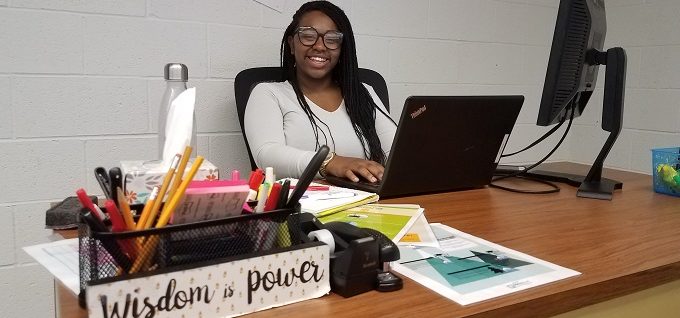A force multiplier for freshmen
By St. Louis Community College Marketing & Communications
October 17, 2019
Helping first-year students navigate college and the adult world.
A group of freshmen attending St. Louis Community College-Forest Park is finding that life as a first-time college student is not as overwhelming as they might originally have thought.
The College has partnered with College Bound St. Louis to develop a well-rounded program to help these students develop higher level skills that prepare them to navigate not just college, but also the adult world.
College Bound STLCC (formerly known as Be STLCC) is a free program that currently serves nearly 130 first-time college freshmen at the Forest Park campus. Each student is assigned a college coach who knows how to be a successful college student. Coaches follow up with students about classes, financial aid, registration and many other aspects of college life. The goal is to get to know each participant as a person.
“Feeling engaged on campus and like you belong in college are two major factors that impact whether students return,” Mariah Opager, assistant director of innovative projects at College Bound St. Louis, said. “Having a physical space on campus filled with people committed to your growth and success, where you encounter other students like you, and where you feel seen and valued can ground students in their academic experience. Our room becomes a ‘home base’ for students in many ways, and acts as a microcosm of the campus at large.”
Pilot program yields promise
STLCC-Forest Park entered into the partnership in 2017 after discussions with representatives from College Bound St. Louis and St. Louis Public Schools. According to Scott Baier, executive director of College Bound St. Louis, it took about a year to learn about each organization, then lay down a plan for engagement and support of first-time SLPS students attending STLCC-Forest Park.
“We set ourselves up as a ‘force multiplier’ resource for students – designed so that first-time college-going students could navigate the process of their first year; to be an active, intrusive intervention that would allow students to take advantage of all the great opportunities at STLCC and that they fully understand the ramifications of their actions,” Baier said.
The pilot program from fall 2017 to fall 2018 has yielded promising results. During that period, the 58 participants achieved a grade-point average of 2.35, and averaged 15.55 credit hours earned. Of the 58 students, 81 percent (47 students) enrolled for classes in fall 2018, and 74 percent remained in good academic standing. In comparison, only 43 percent of identified SLPS graduates not enrolled in the program returned for fall 2018, and averaged 15 credit hours earned. And only 40 percent of them remained in good academic standing.
“This is an excellent program, with committed staff who possess great coaching and mentoring skills,” said Franklyn Taylor, Forest Park’s vice president for student affairs. “They are making every attempt to adopt best practice in working with college students, and continue to collaborate well with our academic and student affairs offices.”
Opager said understanding a student’s motivation, commitment and determination open the door to helping them succeed. But other factors may impede their progress.
“College is an academic triathlon and for the populations we serve, making good grades is only a small part of the enormous endeavor of managing life outside of the classroom,” Opager said. “Between financial barriers, obligations to family, mental and emotional challenges, and even things like violence, housing insecurity or food insecurity, students experience an onslaught of potential academic disruptions to deal with.”
That’s where the college coaches intervene.
Coaches are AmeriCorps service members who have up to six required one-hour meetings with students each semester. They discuss topics such as balancing work, home and school, using academic support services, and dealing with personal concerns. If things seem overwhelming, coaches connect their students with on-campus professionals who can help navigate the issues.
Shakiyla Hughes, one of the college coaches, said students are generally very receptive of the one-to-one relationships that exist between themselves and a coach.
“I believe for these relationships to work well, coaches have to build their relationships from a place of genuineness, individuality and passion,” she said. “As a coach, it is your responsibility to pay close attention to your students’ overarching and underlying needs. As you notice voids that can be filled by resources you aware of, a students’ comfort accessing those resources should be assessed. A coach’s ability to make this interaction more of a conversation and less of a referral to a resource makes a huge difference, and this can be seen in their willingness to seek out and utilize resources such as our mental health services. Generally, once you have established a strong foundation of trust between yourself and the students, they’re receptive to recommendations made to participate in the other programs that we offer.”
Carnell Johnson, who attended Soldan High School, is now in the general transfer studies program at Forest Park. A friend provided the tip about College Bound STLCC, which helped Johnson get off to a good start. He now is in his second year with the program.
“Since it was my first year when I joined, I figured that it would help me get used to college,” he said. “The program has helped me learn to manage my time, keep me updated with my financial aid, register for classes each semester, and how me how to build up my credit score, just to name a few.”
There’s more to the story! Read the full article here.



